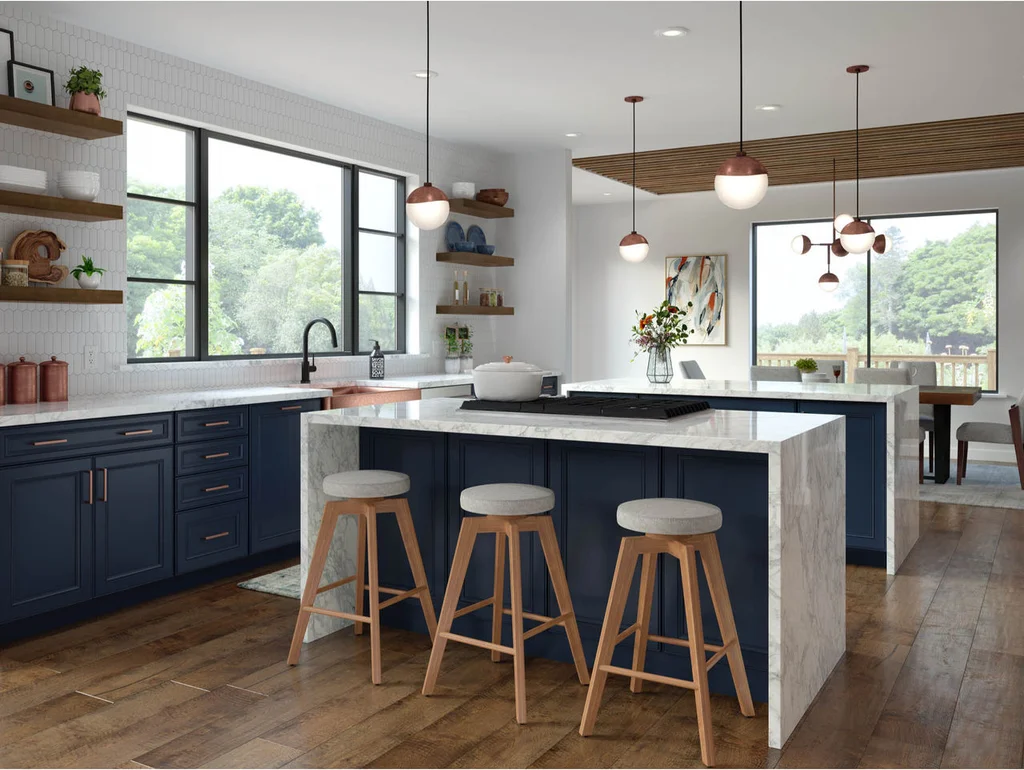What is the lowest maintenance countertop material? Natural stone countertops bring a timeless elegance to kitchens and bathrooms, but one common concern among homeowners is the maintenance these materials require. If you're in love with the beauty of natural stone but want to minimize upkeep, it's important to choose a material that balances aesthetics with practicality. Let's dive into what is the lowest maintenance countertop material options and how to care for them.
1. Granite
Granite is one of the most popular choices for homeowners seeking a natural stone countertop that is both durable and relatively low-maintenance. While granite does need to be sealed, this is typically only required once a year, and the stone itself is highly resistant to heat, scratches, and stains once sealed.
- Durability: Granite is incredibly hard and can withstand heavy use, which makes it a great option for busy kitchens.
- Stain resistance: After proper sealing, granite repels most liquids, including wine and oil, which could otherwise cause stains.
- Simple cleaning: Daily cleaning with mild soap and water will keep the surface looking beautiful. Avoid harsh chemicals to preserve the sealant.
2. Quartzite
Not to be confused with engineered quartz, quartzite is a natural stone that offers the best of both worlds: the look of marble and the durability of granite. It’s a great option for homeowners who want a sophisticated stone without the high maintenance of softer stones like marble.
- Heat and scratch resistance: Quartzite is very durable, able to resist heat and scratches better than many other natural stones.
- Low porosity: Some types of quartzite have low porosity, which makes them naturally resistant to stains. However, applying a sealant once a year will enhance this protection.
- Easy upkeep: Clean your quartzite countertop with mild soap and water. Avoid acidic or abrasive cleaners to preserve the stone’s finish.
3. Soapstone
Soapstone is another natural stone that’s relatively low-maintenance compared to other materials. Known for its smooth, matte finish and rich dark color, soapstone is softer than granite and quartzite but highly resistant to heat and stains.
- No sealing required: Unlike granite or marble, soapstone is non-porous and doesn’t require sealing, making it easier to maintain over time.
- Heat resistant: Soapstone can withstand hot pans being placed directly on the surface without damage.
- Unique aging: Over time, soapstone develops a natural patina that adds character to its appearance. While it can scratch, these marks can easily be buffed out with light sanding or mineral oil.
4. Marble
Marble is beloved for its classic beauty, but it’s also known to be more high-maintenance due to its softness and porous nature. However, if you're committed to the elegance of marble, choosing a polished finish and following a few care guidelines can help reduce maintenance needs.
- Polished vs. honed finish: A polished finish is more stain-resistant than a honed (matte) finish. Polished marble is also easier to clean and less prone to etching from acidic substances.
- Sealing is key: Sealing marble once or twice a year will help prevent stains and protect the surface from etching caused by acidic foods like lemon juice or vinegar.
- Daily care: To clean, use a gentle stone cleaner or mild soap and water. Avoid abrasive scrubbers and acidic cleaners, which can damage the surface.
5. Travertine
Travertine is a type of limestone that has a distinct look with its natural pits and grooves. While it’s a bit softer than granite or quartzite, with the right care, travertine can still be a relatively low-maintenance option.
- Sealing: Like marble, travertine requires sealing to protect it from stains and moisture. However, it’s less prone to etching than marble.
- Filling for a smoother surface: Travertine's characteristic holes can be filled to create a smoother, easier-to-clean surface. Unfilled travertine requires a bit more maintenance to keep dirt and liquids from accumulating in its natural texture.
- Cleaning: Use mild soap and water for daily cleaning and avoid harsh chemicals. Regular sealing will keep it looking fresh and resistant to stains.
Tips for Maintaining Natural Stone Countertops
No matter which natural stone you choose, following a few basic care tips can make a world of difference in minimizing maintenance:
- Seal your countertops: Most natural stones need to be sealed to protect them from moisture and stains. Granite, marble, and travertine benefit from sealing, while soapstone and some quartzites may not need it as often.
- Use gentle cleaners: Always use a pH-balanced cleaner or mild soap and water. Avoid acidic or abrasive cleaners that can wear down the stone’s seal or cause etching.
- Wipe up spills immediately: Acidic substances like wine, coffee, lemon juice, and vinegar can cause etching or staining, especially on marble. Wiping up spills right away will help keep your stone looking its best.
- Use trivets and cutting boards: While many natural stones are heat and scratch resistant, using trivets and cutting boards will prevent any potential damage from hot pans or sharp knives.
Conclusion
Among what is the lowest maintenance countertop material, natural stones, granite, quartzite, and soapstone offer the lowest maintenance while still providing stunning, natural beauty for your countertops. Each of these materials brings unique benefits—granite’s toughness, quartzite’s elegance, and soapstone’s hassle-free upkeep. Marble and travertine, though slightly more demanding, can also be great options if you're willing to give them a bit of extra care. By sealing your countertops and following proper cleaning techniques, you can enjoy the beauty of natural stone without the headache of constant maintenance.

